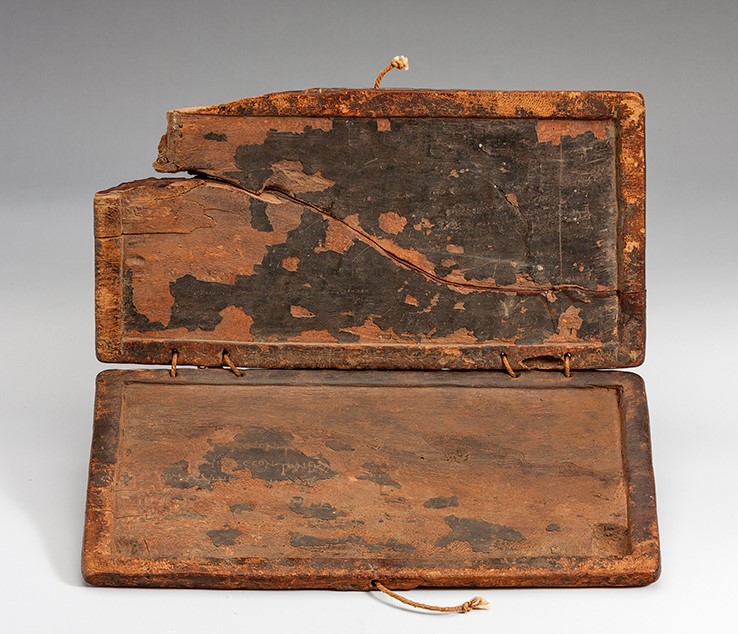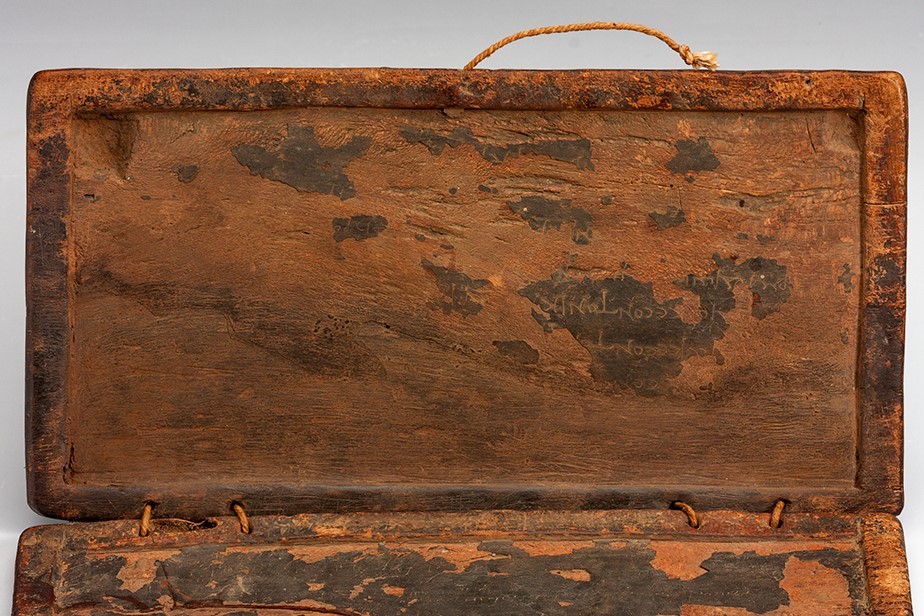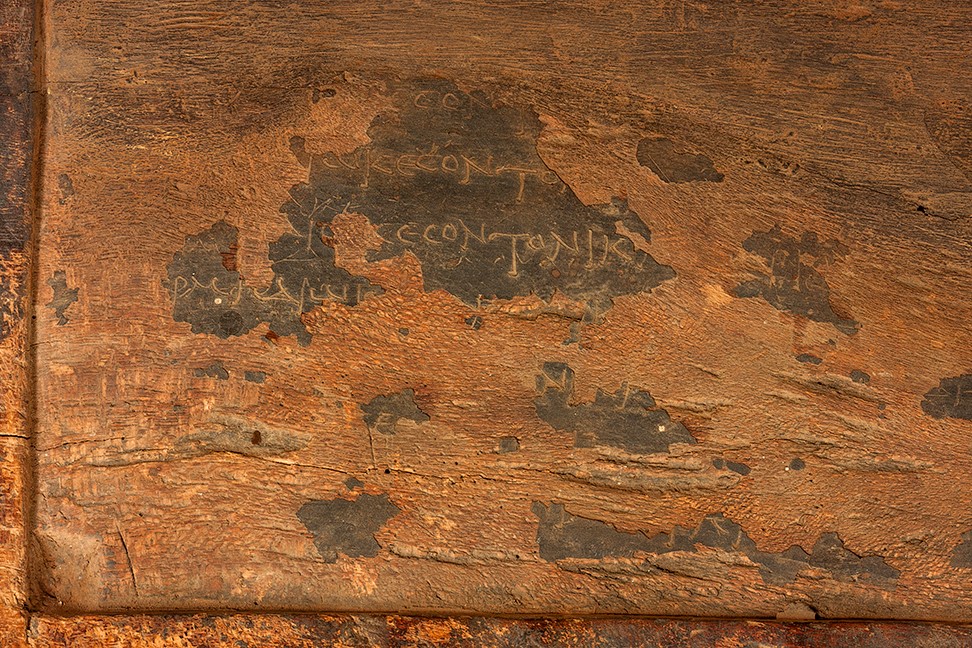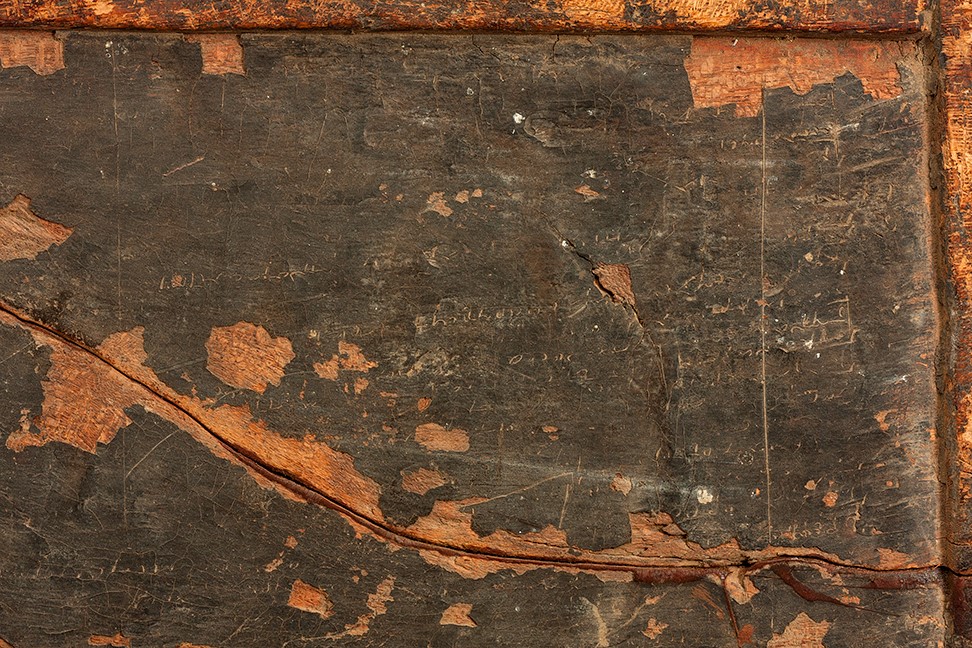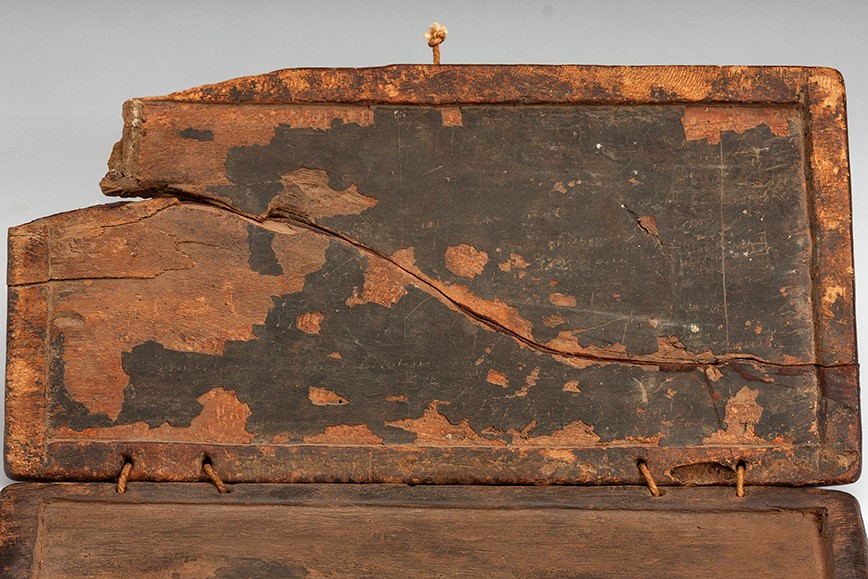Acquisition number: 1973.01
A double writing tablet of wood, the inner faces recessed and bearing some remains of wax. The wood is worn and somewhat worm-eaten. The right leaf is split and its upper right corner missing; the left leaf has its lower right corner missing and restored. It has depressions in the outer corners. The hinge and binding cords are modern.
]ερμηδιςκεσοντονικη[
Some further letters are preserved on the small areas of wax to the right in the illustration.
Title: Writing Tablet - 1973.01
Acquisition number: 1973.01
Author or editor: J.R. Green
Culture or period: Romano-Egyptian.
Date: 1st - 2nd century AD.
Material: Wood
Object type: Writing materials
Dimensions: 11mm (l) × 162mm (w) × 212mm (h)
Origin region or location: Egypt
Display case or on loan: 6
Keywords: Roman, Imperial, Romano Egyptian, Inscription, education
Charles Ede Ltd (London),Writing and Lettering in Antiquity (1972) no. 37 (ill.); J.R. Green with B. Rawson, Catalogue of Antiquities in the Australian National University, A.N.U. (Canberra, 1981) 120.
1973.01
Writing Tablet
Purchased; probably from Egypt. One leaf: ht 21.2cm; width 16.2cm; thickness 1.1cm.
A double writing tablet of wood, the inner faces recessed and bearing some remains of wax. The wood is worn and somewhat worm-eaten. The right leaf is split and its upper right corner missing; the left leaf has its lower right corner missing and restored. It has depressions in the outer corners. The hinge and binding cords are modern.
]ερμηδιςκεσοντονικη[
Some further letters are preserved on the small areas of wax to the right in the illustration.
The repetitive nature of the text indicates a schoolboy exercise. On the use of writing tablets and good discussion of primary education in Hellenistic to Roman times, see H.-I. Marrou, A History of Education in Antiquity (trans. G. Lamb, London 1956) 215ff., and more recently T. Morgan, Literate Education in the Hellenistic and Roman Worlds (Cambridge 1999).
On writing tablets in general, see K. Painter, British Museum Quarterly 31, 1966-67, 101-110; A.K. Bowman and J.D. Thomas, Vindolanda. The Latin Writing Tablets (Britannia Monograph Series 3, 1983); P. Degni, Usi delle tavolette lignee e cerate nel mondo greco e romano (Ricerca papirologica 4, Messina 1998); J. Whitehorne, “The Kellis Writing Tablets: their Manufacture and Use”, in: D.M. Bailey, (ed.), Archaeological Research in Roman Egypt: The Proceedings of The Seventeenth Classical Colloquium of The Department of Greek and Roman Antiquities, British Museum (JRA Supplement 19, 1996) 240-245; and more recently the overview by B. Hartmann, “Die hölzernen Schreibtafeln im Imperium Romanum – ein Inventar”, in: M. Scholz and M. Horster (eds), Lesen und Schreiben in den römischen Provinzien (RGZM Tagungen, 26, Mainz 2015) 43-58. There is a useful article on the scrapers used for removing the wax from writing tablets by W. Gaitsch, Bonner Jahrbücher des Vereins von Altertumsfreunden im Rheinlande 184, 1984, 189-207. For an interesting discussion of tablets with arithmetical calculations, see P. Cauderlier, Revue Archéologique 1983, 259-280 (with refs.). See too the interesting article by E.A. Meyer, “Writing Paraphernalia, Tablets, and Muses in Campanian Wall Painting”, American Journal of Archaeology 113, 2009, 569-597.
É. Lalou (ed.), Les tablettes à écrire de l’Antiquité à l’Époque Moderne. Actes du colloque int. du CNRS, Paris, 10-11 octobre 1990 (Bibliologia 12, Turnhout 1992)
More generally, see R. Cribiore, Writing, Teachers, and Students in Graeco-Roman Egypt (American Studies in Papyrology 36, Atlanta 1996) and R.S. Bagnall, Egypt in Late Antiquity (Princeton 1993), especially Chapter 7, “Languages, Literacy, and Ethnicity”.
For a short article on the use of computer-enhanced imaging to read writing tablets, see A.K. Bowman and R.S.O. Tomlin, “Wooden Stilus Tablets from Roman Britain”, in: A.K. Bowman & M. Brady (eds), Images and Artefacts of the Ancient World (Oxford: British Academy 2005) 7-14
The tablet is perhaps to be dated to the first or second century AD.
Charles Ede Ltd (London),Writing and Lettering in Antiquity (1972) no. 37 (ill.); J.R. Green with B. Rawson, Catalogue of Antiquities in the Australian National University, A.N.U. (Canberra, 1981) 120.
